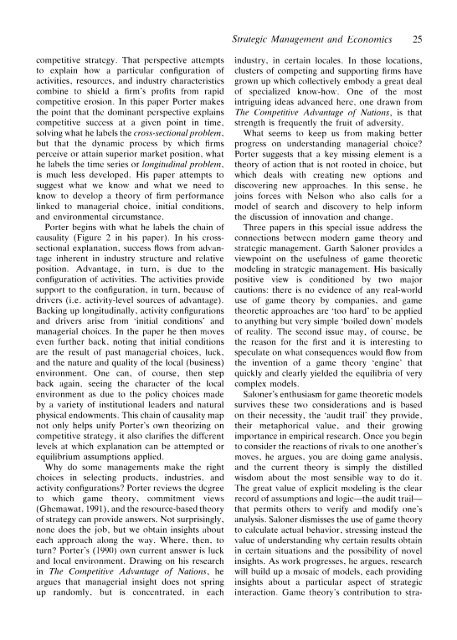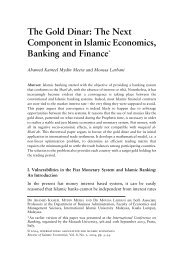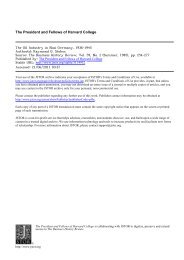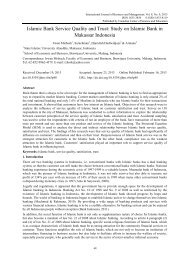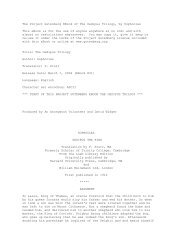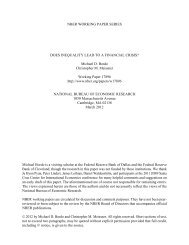Strategic Management and Economics
Strategic Management and Economics
Strategic Management and Economics
You also want an ePaper? Increase the reach of your titles
YUMPU automatically turns print PDFs into web optimized ePapers that Google loves.
<strong>Strategic</strong> Managemenlt <strong>and</strong>l L conomics 25<br />
comrpetitive strategy. That per-spective attempts industry, in certaini locales. In those loca-ttions,<br />
to explainl how a particular configuration of cluster-s of competing <strong>and</strong> supporting firms have<br />
activities, riesources, <strong>and</strong> indLustry characteristics growni up which collectively embody a grea-It (leal<br />
combine to shield a firmns profits from rapid of specialized know-how. One of the most<br />
competitive erosionl. In this paper- Porter mnakes intriguing ideas a(lvanced here, one drawn fr-om<br />
the point that the dominant per-spective explains Th,e (Coinpetitive Advisantage o( Ntdtionis, is that<br />
competitive success at a given point in time, strenigtlh is frequenitly the fruit of adversity.<br />
solving what he labels the cross-sectional ptrobleln, Whait seems to keep us fromii making better<br />
but that the dynamic process by which firms progr-ess on undlerst<strong>and</strong>ing managerial choice?<br />
perceive or attain supenior market position, what Po rter suggests that a key missing elemenit is a<br />
he labels the time series or lonigitiudinatil prolleml, theory of action that is not rooted in chcoice, but<br />
is much less developed. His paper attemipts to whiclh deals with creating new optioins aind<br />
suggest whalt we know <strong>and</strong> what we need to discovering new aipproaches. In this sense, he<br />
know to develop a theory of firm performance joinis forces with Nelson wvho also calls for a<br />
linke(d to managerial choice, initial conlitions, mlo(el of search aind discovery to help inform<br />
ancl environmental circumstance.<br />
the discussion of innovation <strong>and</strong> change.<br />
Porter begins with what he labels the chain of Thl-ee papers in this special issue addiress the<br />
causality (Figure 2 in his paper). In his cross- connections between modern garme theo ry <strong>and</strong><br />
sectional explanationi, success flows fromii advan- str-ategic management. Garth Saloner providles a<br />
tage inher-ent in indlustry structule ancd relative viewpoint on the usefulness of game theor-etic<br />
position. Advanitiage, in turin, is dlue to the mcodcelinig in strategic managemienit. His basically<br />
configuration of activities. The activities provide positive view is conditioned by two imajor<br />
support to the configuration, in turn, becaslLlse of cautions: there is no evidenice of any real-wvorld<br />
drivers (i.e. activity-level souices of advantage). use of game theory by companies, anld game<br />
Backing up longitudinally, activity configuLr-tions theoretic approaches are 'too hard' to be applied<br />
<strong>and</strong> (driver-s arise from 'initial conditions' <strong>and</strong> to ainything but very simple 'boiled down' mlodels<br />
managerial choices. In the paper he then moves of reality. The secondcl issue mayV Of Coulrse, be<br />
even fLurther back, noting that initial conditionis the reason for the first ancd it is interesting to<br />
a(re the result of past managerial choices, luck, speculate on wlhat consequences wotuld flow tfrom<br />
<strong>and</strong> the nature <strong>and</strong>(l quality of the local (business) the invention of a game theor-y 'engine' thalt<br />
environlment. One can, of cour-se, theni step quickly <strong>and</strong> clearly yielded the equilibrria of very<br />
back again, seeinig the character of the local complex models.<br />
environimlent as dlue to the policy choices miacle Saloner's enthusiasm for game theoretic modlels<br />
by a variety of institutional leaders <strong>and</strong> natural survives these two considerationls <strong>and</strong> is based<br />
physical endowmlenlts. This chalin of causality map on their necessity, the 'audit trail they provide,<br />
not only helps unify Porter's own theorizing on their metaphoiricatl value, <strong>and</strong> their growing<br />
competitive strategy, it also clarifies the differenit impor-tanice in empirical research. Once you begin<br />
levels at which explanation can be attemptedl or to considler the reactionis of rivals to one another's<br />
equilibr ium assumptions appliedl.<br />
moves, he argues, you are doinig game analysis,<br />
Wly do soImie milanagemienlts make the r-ight <strong>and</strong> the cuiirrent theory is simply the cdistilled<br />
choices in selectinlg products, industries, ancd wis(lom about the most sensible way to (1o it.<br />
activity confiurlations? Porter reviews the degree The great value of explicit modeliing is the clear<br />
to which game theory, commitment views record of assumiiptions <strong>and</strong> logic-the audit trail-<br />
(Gheniawat, 199 1), ancd the resource-basedl theory that permits others to verify aniid miodify one's<br />
of strategy can provide answers. Not surprisinigly, analysis. Saloner (dismisses the use of game theory<br />
none (loes the job, but we obtain insights aibout to cialculalte actual behavior, stressing insteaid the<br />
each wapproach alonig the w\ay. Where, then, to value of understainding why certain results obtain<br />
turnl'? Porter's (1990) OWIn CuIienit answer is Iluck in certaini situations anid thie possibility of novel<br />
<strong>and</strong>l local environmiiienit. Drawing on his researcl insights. As work pr-ogresses, lie argues, researi-ch<br />
in Thle Cotnpetitive Advc,antage of Nations, he will build up a mosaic of m ciels, each providinig<br />
argues that managerial insight dloes not spring insights about a particular aspect of striategic<br />
up ranclonmly, buLt is concentrated, in each inlteractioin. Gamile thieorrV's coiltribLution to stra-


